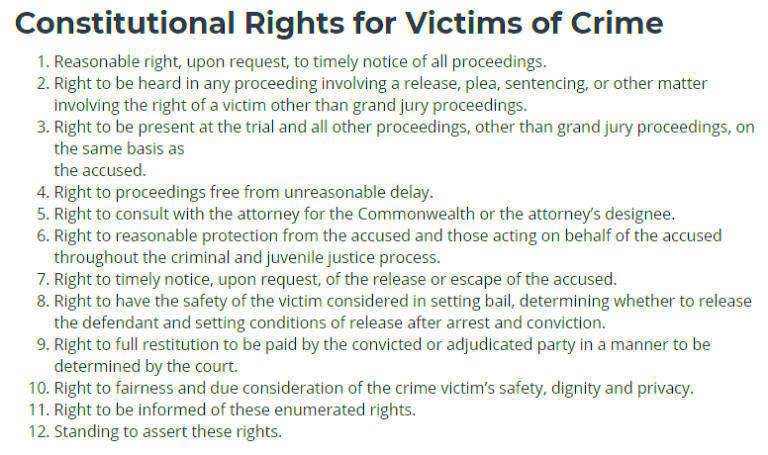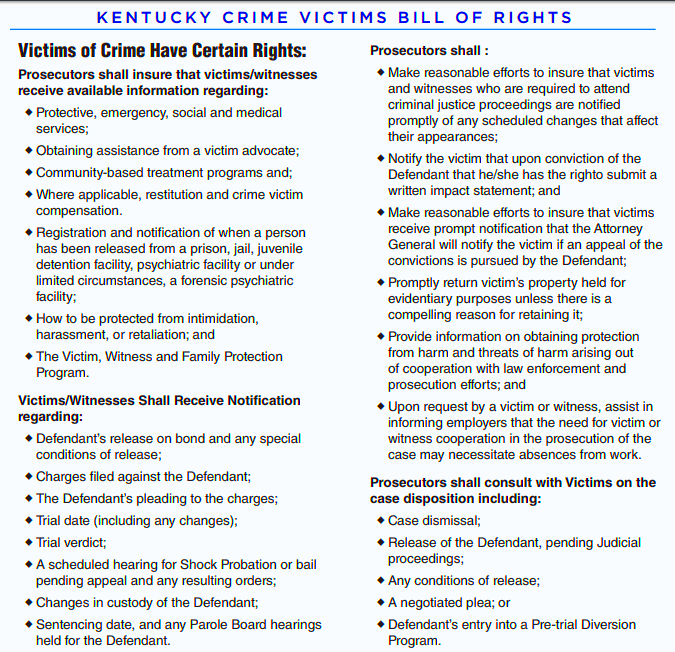Key Points of Marsy’s Law in Kentucky
Marsy’s Law is an important piece of legislation aimed at enhancing the rights of victims in Kentucky. It was enacted to ensure that victims of crime have a voice in the legal process and receive the support they need. The law is named after Marsy Nicholas, a college student who was murdered in 1983. Her family was not informed of her assailant’s release from prison, which prompted a nationwide movement for victims’ rights. In Kentucky, this law aims to provide a comprehensive framework to protect and empower victims during the criminal justice process.
Key Provisions of Marsy’s Law

Kentucky’s Marsy’s Law comprises various essential factors engineered towards improving victims’ rights. These factors guarantee that all the victims are treated with honor and integrity from the beginning to end of a justice system. The fundamental outlines include:
- Right to Notification: Victims have the right to be informed about the status of their case and any relevant proceedings.
- Right to Be Heard: Victims can participate in hearings and have the opportunity to express their views.
- Right to Protection: Victims are entitled to protection from harassment or intimidation.
- Right to Restitution: Victims can seek compensation for their losses resulting from the crime.
- Right to Privacy: Victims’ information is protected to maintain their privacy during the proceedings.
Impact on Victims’ Rights
In Kentucky, Marsy’s Law has had a great effect on the rights of victims. It is noteworthy that it has changed the role of criminal justice system from giving more weight to other issues rather than those of victims. Some important impacts are as follows:
- Increased Awareness: There is now greater awareness among law enforcement and legal professionals regarding victims’ rights.
- Empowerment: Victims feel more empowered to participate in the legal process, knowing their rights are protected.
- Support Services: The law encourages the establishment of support services for victims, helping them navigate the complex legal landscape.
That is a statement of fact, in other words, this new system allows the victims feel safe and protected while helping the justice system become fairer. At the same time, the legislation represents an acknowledgment that there are individuals who have suffered and who need consideration from the law.
Enforcement Mechanisms of Marsy’s Law
One of the things envisaged in Marsy’s Law is to have several enforcement mechanisms for the victims’ rights. These mechanisms are important in holding law enforcement and judicial systems accountable for their actions. Thus, they aim at providing victims with explicit avenues through which they can assert their rights and seek justice. Below are some of the enforcement strategies that could be looked into:
- Legal Recourse: Victims can file complaints if their rights are violated. This allows them to seek judicial intervention and remedy any grievances.
- Training and Education: Law enforcement agencies and court officials receive training on victims’ rights to ensure compliance with the law.
- Victim Advocates: Many counties have victim advocates who support individuals in navigating the legal system and can assist in asserting their rights.
- State Oversight: The state monitors compliance through regular assessments and reporting, ensuring that the provisions of the law are followed.
Such mechanisms play a crucial role in developing a model that enables victims to take charge of their own situations. By providing victims with direct avenues to claim their entitlements, Marsy’s Law fosters a legal framework that is more considerate and attentive to the needs of those it serves.
Comparison with Other States’ Victims’ Rights Laws
Marsy’s Law is a component of a larger movement aimed at improving victims’ rights in the United States as a whole. While every state has its own unique way of doing things, there are significant similarities and differences when compared to laws of other jurisdictions. In relation to this, we will look at how Kentucky’s law compares to others.
| Aspect | Marsy’s Law (Kentucky) | Other States (e.g., California, Florida) |
|---|---|---|
| Right to Notification | Guaranteed notification of case status | Similar provisions exist, often mandated by state constitution |
| Right to Be Heard | Victims can attend and speak at hearings | Many states provide similar opportunities for victim input |
| Restitution Rights | Right to seek restitution for losses | Most states have restitution provisions, but the process may vary |
Nevertheless, there are variations in the implementation, the resources available, and the overall efficiency of Marsy’s Law and this is in tandem with victims’ rights statutes in different states. These disparities may show areas where Kentucky can improve on its execution.
Challenges in Implementing Marsy’s Law
In spite of its well-meaning aspirations, the enactment of Marsy’s Law in Kentucky encounters numerous difficulties. These hindrances can hamper the ability of the law to genuinely safeguard the rights of victims. Some of these hurdles include:
- Awareness and Education: Not all victims are aware of their rights under the law, making it crucial for outreach and education efforts to be enhanced.
- Resource Limitations: Many victim support services lack adequate funding and resources, limiting their ability to assist victims effectively.
- Variability in Enforcement: Different jurisdictions may have varying levels of commitment to enforcing victims’ rights, leading to inconsistencies in implementation.
- Cultural Barriers: In some communities, cultural stigma around victimization can hinder individuals from coming forward and asserting their rights.
It is important to tackle these issues in order to get the most out of Marsy’s Law. To this end, Kentucky can better serve its victims and protect their rights through increased awareness, sufficient resources and uniform enforcement.
How Marsy’s Law Affects Criminal Proceedings
In Kentucky, criminal proceedings are greatly affected by Marsy’s Law. It alters the victim-offender relationship and shifts the focus in legal cases from perpetrator to victim. Some of the ways in which this law affects criminal justice are as follows:
- Victim Participation: Victims now have the right to attend hearings and present their views, ensuring their voices are heard during critical moments.
- Timing of Proceedings: Courts may consider victims’ needs when scheduling hearings, allowing them to prepare adequately and participate meaningfully.
- Impact Statements: Victims can provide impact statements, expressing how the crime affected their lives, which can influence sentencing and other decisions.
- Notification of Changes: Victims must be notified about changes in the status of the accused, such as parole hearings, enhancing their sense of security.
The transition towards victim’s first not only boosts well-being of victims but also promotes fairer legal framework. Marsy’s Law integrates victims’ rights into the process so as to engender an even system that no longer alienates victims.
Future of Marsy’s Law in Kentucky
In Kentucky, the prospect of Marsy’s Law looks great although there are difficulties. With its evolution, implementation and effectiveness will be grounded on different aspects;
- Increased Advocacy: Advocacy groups are likely to continue pushing for better awareness and resources for victims, ensuring that their rights are upheld.
- Legislative Updates: Future amendments to the law may address current shortcomings, such as enhancing support services and clarifying enforcement mechanisms.
- Public Engagement: Greater community involvement and awareness campaigns can help educate victims about their rights, empowering them to take action.
- Evaluation and Assessment: Ongoing evaluation of how well the law is serving its intended purpose can lead to adjustments that better meet victims’ needs.
While Kentucky is dealing with these changes, the aim would be to establish a scheme that really backs and safeguards the victims of crime as they take part in the criminal justice system.
Frequently Asked Questions
People frequently ask the following questions regarding Kentucky’s Marsy’s Law:
- What is Marsy’s Law? Marsy’s Law is a constitutional amendment aimed at enhancing the rights of victims of crime, ensuring they have a voice in the legal process.
- Who is covered under Marsy’s Law? The law covers all victims of crime, including survivors of violent crimes, property crimes, and their family members.
- How can victims assert their rights? Victims can assert their rights by being aware of their entitlements, attending court proceedings, and communicating with victim advocates.
- What happens if a victim’s rights are violated? If a victim believes their rights have been violated, they can seek legal recourse, including filing a complaint in court.
- Are there resources available for victims? Yes, various resources, including victim advocacy groups, legal aid organizations, and support services, are available to assist victims.
By comprehending such elements of Marsy’s Law, victims will have a better chance of maneuvering through the legal system while making sure that their rights are upheld.
Conclusion
In Kentucky Marsy’s Law is significant progress in the victims’ rights arena as it provides essential protection to victims and ensures that they are heard in criminal justice system. Through putting victims’ rights first, it enables the Crime Victims’ voices’ to be audible though these people have been victims of crime before. It will be important to deal with the challenges posed by its implementation and make sure that all victims know their rights and get support. The future of Marsy’s Law will depend on continued community advocacy and involvement, coupled with possible amendments to the legislation, to make it an effective instrument of justice for all in Kentucky.


